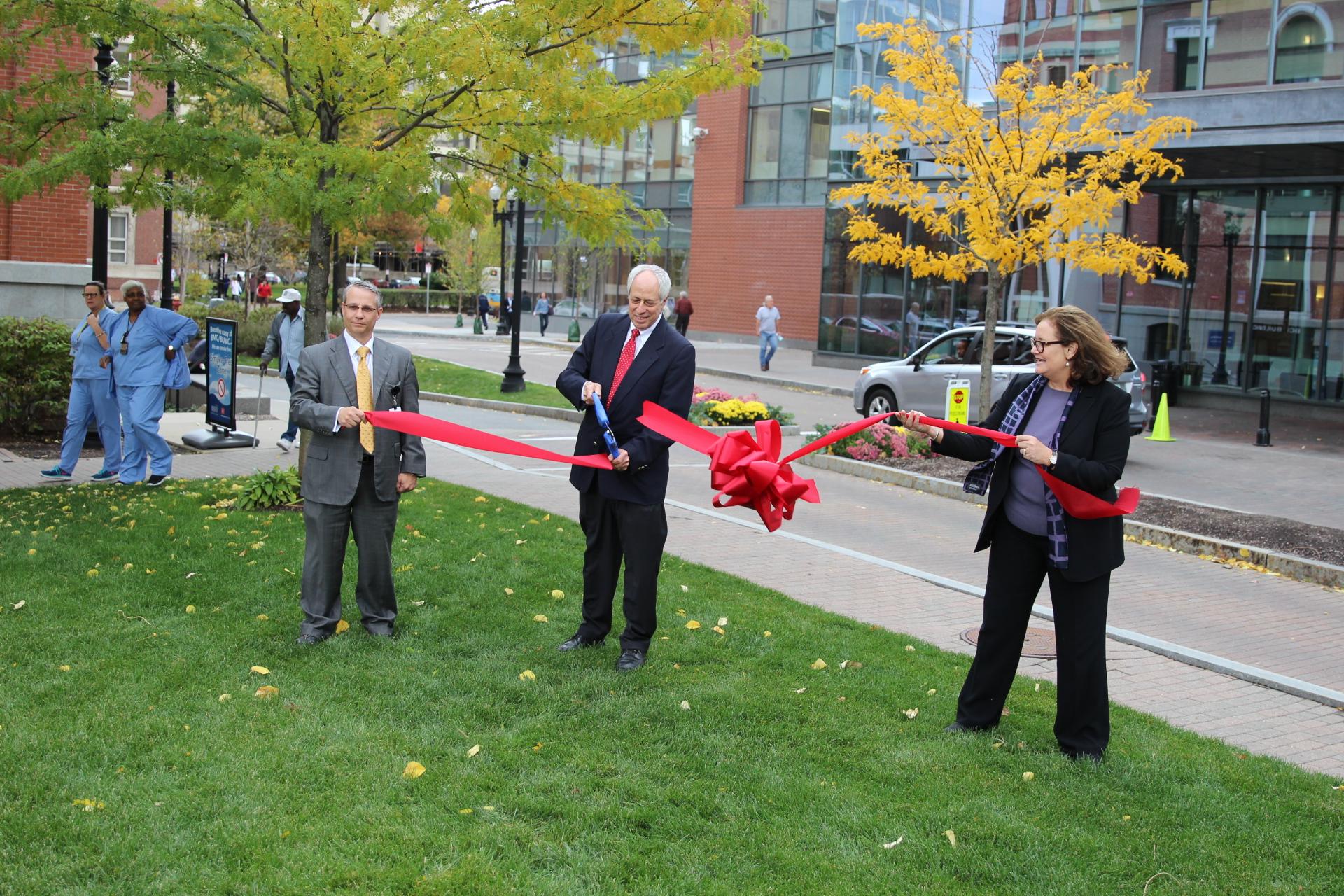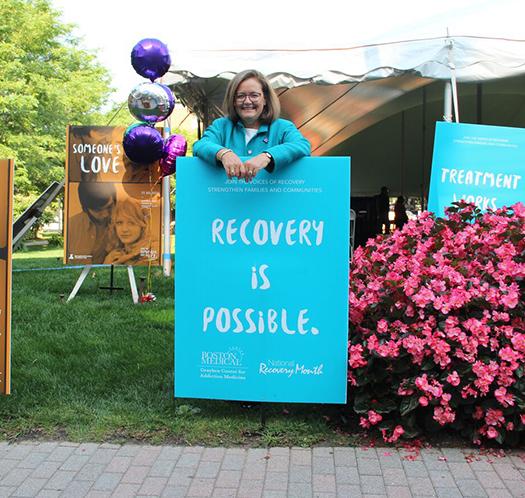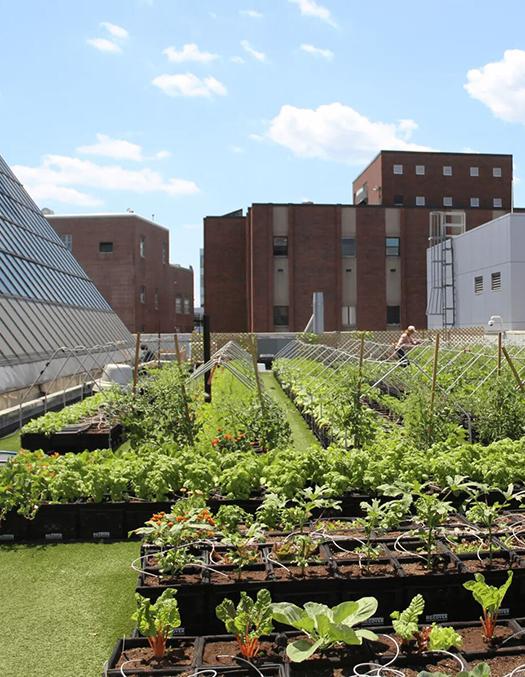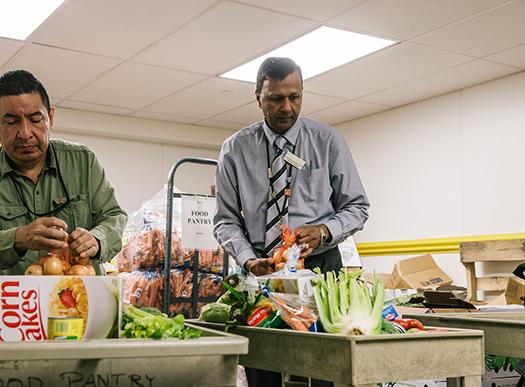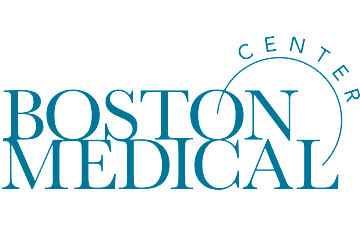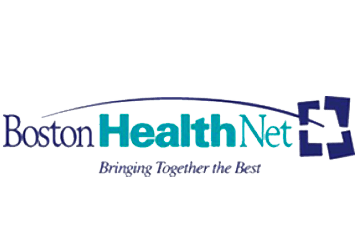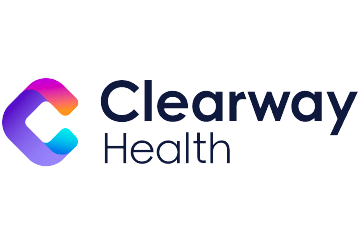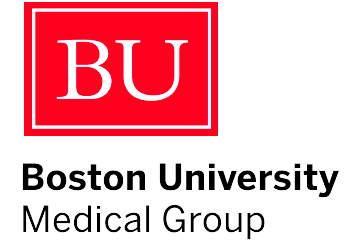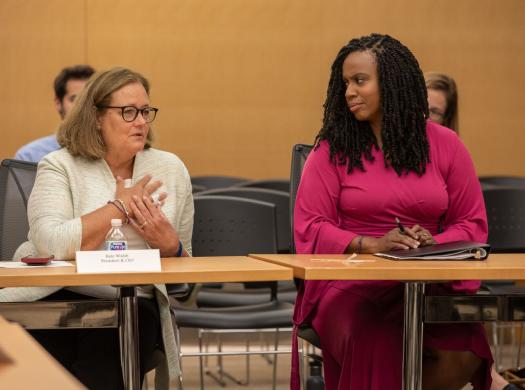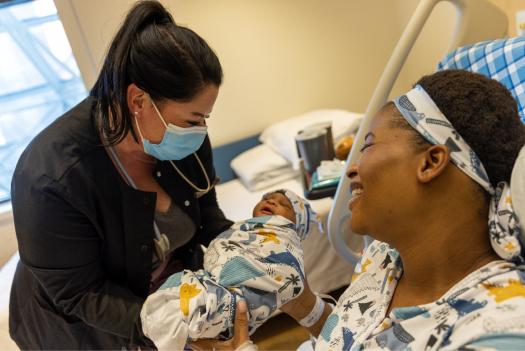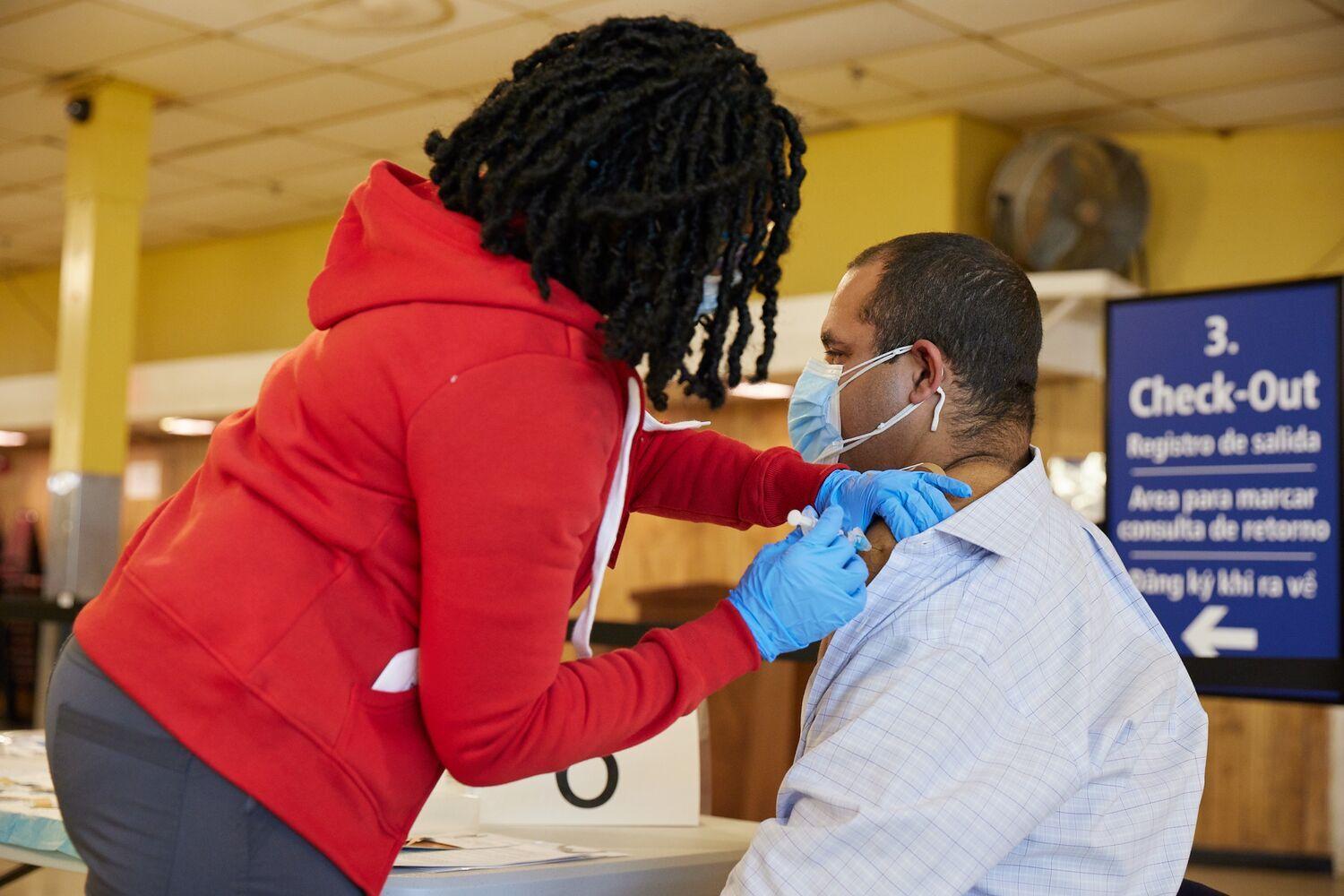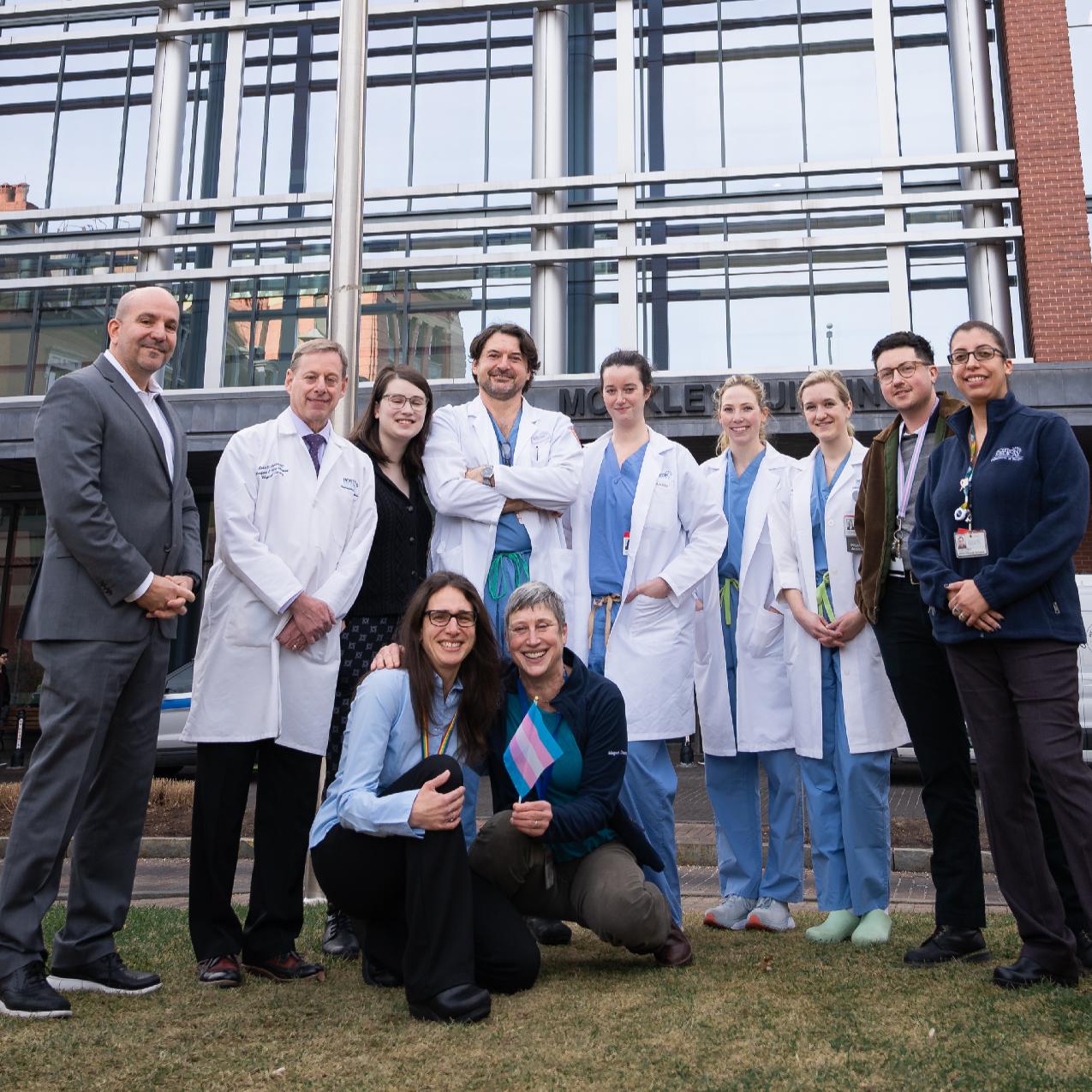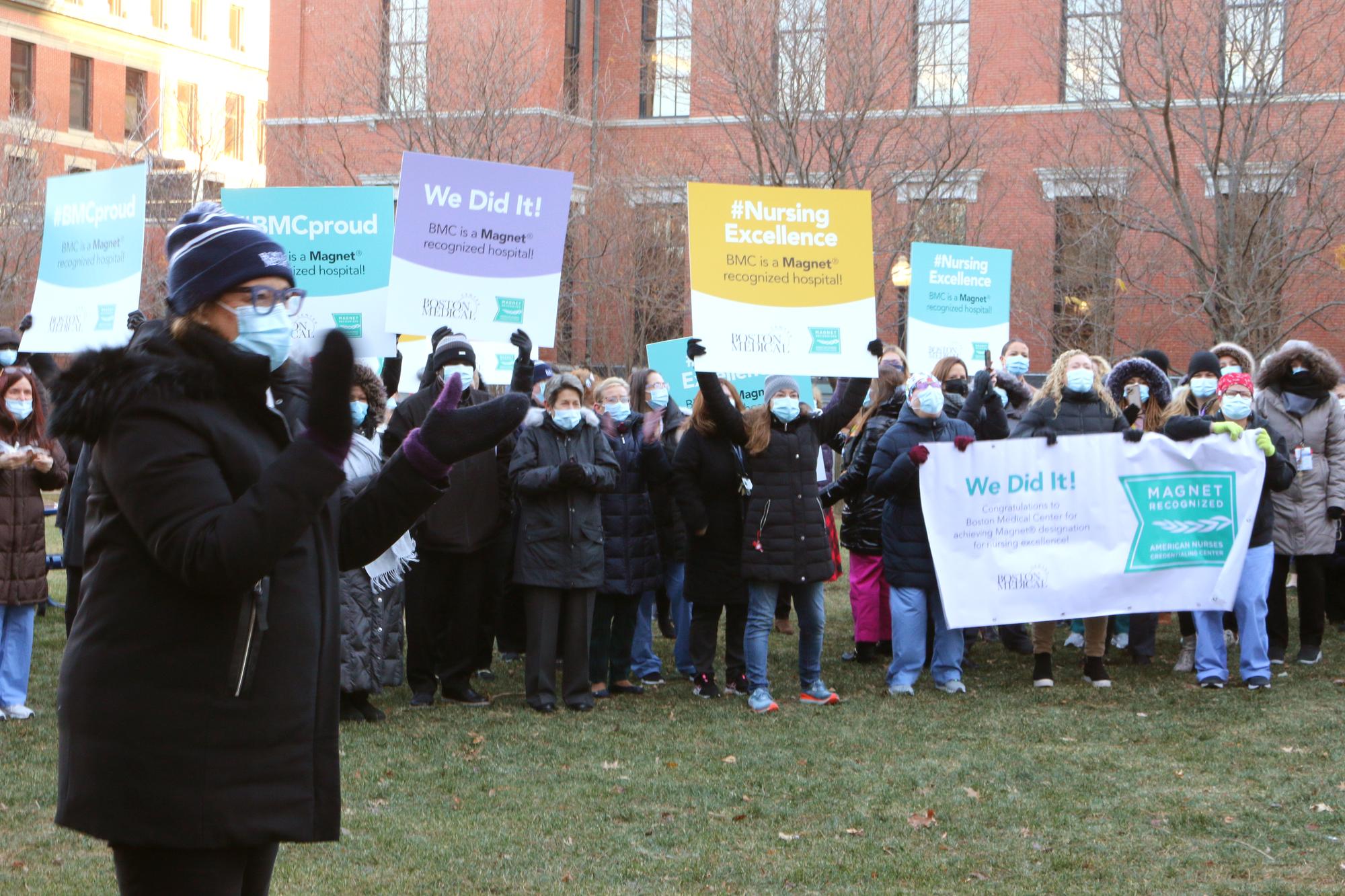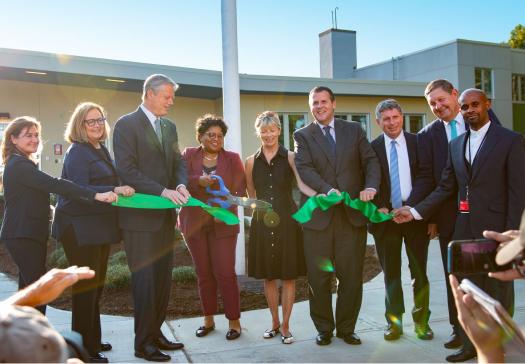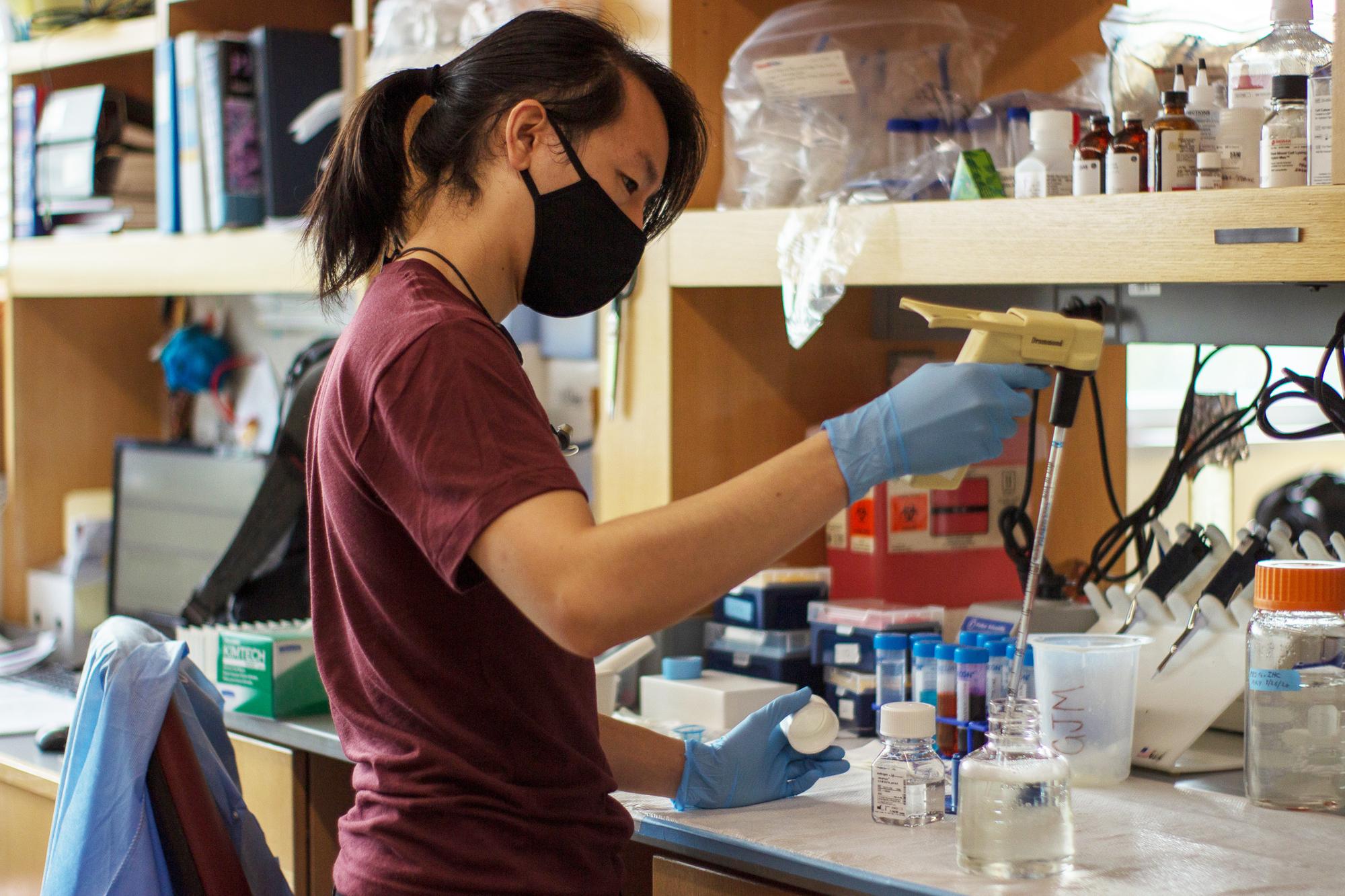Sharing Our Proudest Moments
Boston Medical Center has always embodied a mission of compassion, innovation, and health equity. For 13 years, Kate Walsh and everyone at BMC have worked together to further this mission with the goal of improving the lives of those in our community. From making leaps and bounds in equitable care to building a more sustainable campus, we’ve accomplished so much — and yet, we know there is more to do. While we’re saying goodbye to Kate as CEO, we will continue her legacy of providing exceptional care to all. Here, we share some of BMC’s biggest accomplishments and proudest moments from the past 13 years.
Celebrate with us. Follow BMC on social media.
1. Transformed the BMC campus
In the past 13 years, the BMC campus has grown and changed to help us better serve our patients and the community. In 2011, we opened The Shapiro Center with a $15 million gift from Carl and Ruth Shapiro, and in 2018, completed the first part of a clinical campus redesign. With donor support for our Building the New BMC campaign, we renovated over 250,000 sq. ft. of space, consolidated hospital operations into one campus, and opened new, state-of-the-art spaces such as the Women and Infants Center.
Looking ahead: We plan to carry Kate’s vision into the future, starting with the second part of a clinical campus redesign that kicked off in 2022. This phase will include new outpatient clinics for pediatrics, women’s health, and adult psychiatry; expanded services in the Crosstown Building; inpatient bed suites in the Yawkey Building; and many updates to the Menino Building, including new operating rooms, an expansion of the cafeteria, and easier access to the building.
2. Advanced treatment for substance use disorders
BMC is a pioneer in addiction treatment, offering many groundbreaking programs that meet patients where they are in their recovery journey, as well as serving as a national hub for substance use disorders, providing care models, policy, advocacy, and thought leadership to other medical centers across the country.
Under the BMC Grayken Center for Addiction, made possible with a $25 million gift from John and Eilene Grayken in 2017, BMC continues to revolutionize addiction treatment. The center offers a wide range of programs for people in every stage of life — from teens to pregnant women and families — as well as for those in crisis or struggling with their mental health.
Looking ahead: BMC will continue to innovate new models of care and best practices in the addiction field. And with our $89 million grant for the Massachusetts HEALing Communities Study from the NIH, we are working to reduce opioid overdose deaths in MA by 40 percent.
3. Innovated for a greener future
Together, Kate and BMC have grown BMC into the “greenest” hospital in the city, because we know that healthier hospitals mean healthier communities. Throughout the years, we’ve taken major steps to mitigate climate change, and thanks to these efforts, BMC was named one of the 60 greenest hospitals in the country by Becker’s Hospital Review:
- As part of an innovative solar purchase, we committed to purchasing 26 percent of the power generated by the solar array. This is equivalent to 100 percent of BMC’s projected electric consumption.
- Since 2017, BMC has been generating much of its own electricity and heat through a natural gas-fired, two-megawatt combined heat and power plant (CHP). This makes BMC is the only major teaching hospital in Massachusetts with “black start” capability, meaning if the electric grid goes down, the hospital can power its inpatient units for months at a time, as well as serve as backup power for emergency communications for the City of Boston.
- Recognized with a host of awards including Practice Greenhealth’s Top 25 Greenest Hospitals; an Emerald Award for Excellence in Sustainability; Circle of Excellence Awards for top 10 nationwide performance in addressing climate change, green building, and reducing and using cleaner energy; Norman B. Leventhal Award for Excellence in City Building – Environment; Association of Energy Engineers Energy Project of the Year Award; and the Outstanding Campus-wide Energy Project Award
- BMC’s Rooftop Farm, which opened in 2017, reduces the hospital's carbon footprint and increases our green space. It also provides nutritious produce to our patients, cafeterias, Teaching Kitchen, and Preventive Food Pantry.
- The BMC Brockton Behavioral Health Center, opened in 2021, is the first inpatient psychiatric hospital in the country that is 100 percent net zero for carbon emissions.
Looking ahead: As part of BMC’s pledge to become carbon-neutral and reduce greenhouse gas emissions by 50 percent by 2030, we are transforming our clinical campus. Our efforts so far have reduced our utilities expenses by over $10M per year, and we have invested those savings back into patient care. We continue to adapt in order to thrive well into the future.
4. Invested in holistic care
Kate and other BMC leaders continue to advance BMC’s mission to not only to treat disease, but also to understand and address the social and environmental challenges that contribute to physical and mental health issues. For decades, BMC has focused on addressing these social determinants of health (SDOH) on both an individual and systemic level, with the goal of building better, lasting health for patients and communities.
- BMC nourishes our community with medically and culturally appropriate foods. In 2001, we opened the first hospital-based food pantry to help patients feed themselves and their families with nutritious foods. The pantry currently serves almost 85,000 patients and their household members each year. And in 2017, our Rooftop Farm opened to supply fresh produce for the Preventive Food Pantry and our hospital meals.
- In 2016, we established StreetCred to help families with children receiving care at BMC to take advantage of tax credits and other wealth-building opportunities. As of 2021, StreetCred has put more than $11 million back in the pockets of the families and is now modeled nationally, with more than 20 sites.
- BMC has put $6.5 million into affordable housing by investing in a diverse group of community partnerships in neighborhoods where many of our patients already live.
- In 2019, BMC launched the THRIVE screener, which helps us identify and address our patients’ social determinants of health needs, such as housing, food insecurity, transportation, and employment.
- BMC led the launch of The Boston Opportunity System (BOS) Collaborative, aimed at helping residents of historically underserved neighborhoods find better paying jobs and increase access to affordable housing.
Looking ahead: We will continue to work gain a better understanding of our patients’ complex needs and to enact upstream, systemic changes to reduce poverty and improve people’s lives. This includes projects such as the opening of the Nubian Markets, a BIPOC-owned local grocery store offering healthy foods in the heart of Roxbury’s Nubian Square.
5. Transformed a hospital into a health system
In 2019, we transformed BMC into Boston Medical Center Health System. BMC Health System includes six major entities serving patients and health plan members in Massachusetts and New Hampshire:
The system provides world-class care to all, with an emphasis on health equity, clinical and research excellence, and the treatment of complex conditions through a value-based, coordinated continuum of care, which lowers costs and improves outcomes.
BMCHS’ work was recognized by the Baker-Polito Administration, who chose Wellsense to expand its participation in the Accountable Care Organization program, doubling the number of its MassHealth ACO partnerships from four to eight, while improving care and coordination for members in its network.
Looking ahead: In April, WellSense will become the largest Medicaid health plan in the state, supporting the care of nearly 40 percent of MassHealth ACO members. As BMC Health System continues to grow, we will continue to find innovative ways to bring exceptional health care to all.
6. Influenced public policy
Throughout her tenure, Kate and BMC have had a real impact on policies affecting the practice and delivery of health care in Massachusetts and beyond. She regularly hosted legislative and health agency leaders from federal, state, and city government. In 2022, Kate and other BMC leaders made five trips to the White House to weigh in on a range of topics, including COVID-19 response, climate, food and nutrition, housing, and tax assistance programs. And since 2018, BMC experts have been called to testify before Congress on four separate occasions.
Public policy wins during her tenure include:
- Approval of three five-year 1115 waivers by CMS and MassHealth with terms favorable for BMC, and with major reforms to how health care is delivered to MassHealth patients. The 2017 waiver created the MassHealth ACO program. The 2022 waiver makes significant new funds available to hospitals and ACOs meeting equity benchmarks, funded by federal matching funds to a provider tax approved by the state legislature in 2022.
- Securing state and federal relief funding to sustain hospital operations during the height of the COVID-19 pandemic.
- Securing $12 million in state funding to help cover one-time start-up costs for the BMC Brockton Behavioral Health Center.
- Providing support for the Mayor’s citywide Mass and Cass plan, working with the city to open temporary, transitional housing
- Advocating for landmark substance use disorder legislation at state and federal levels to increase access to evidence-based addiction treatment and bolster the workforce for these programs.
- Regularly hosting legislative and health agency leaders from federal, state, and city government.
Looking ahead: BMC is dedicated to influencing systemic change to improve the health and well-being of the community we serve. We look forward to being a strong ally to Kate as she seeks to advance a health equity agenda for the Commonwealth in her new role as Massachusetts Secretary of Health and Human Services.
7. Championed health equity
Health equity has always been at the heart of BMC’s work. In 2021, BMC launched the Health Equity Accelerator, a system-wide effort to transform health care to eliminate gaps in life expectancy and quality of life among different races and ethnicities. The goal of the Accelerator is to close the deepest, most pervasive health care gaps among people of different races and ethnicities through research and development, transforming clinical operations, and engaging with community partners and patients.
BMC has also been recognized by the Lown Institute for its inclusiveness, ranked as the #4 most racially inclusive hospital and the #4 most socially responsible hospital – and #1 in Massachusetts in both categories.
In 2022, one of our generous donors established the Kathleen E. Walsh Health Equity Fellowship in recognition of Kate’s commitment to health equity. The fellowship provides support for early-career physicians looking to build executive leadership skills to champion health equity, and will give fellows a unique and deep understanding of health equity, the structural drivers of health, racism in medicine, and hands-on project design and implementation experience.
Looking ahead: BMC’s health equity work is driven by a bold vision to transform health care, both at BMC and across the full system of care. In the year to come we will be particularly focused on equity in pregnancy and diabetes. We will continue to train future equity leaders, deeply interrogate gaps in care and outcomes, and propel health care towards health justice.
8. Led nationally through the pandemic
BMC leaders, clinicians, and staff came together and innovated throughout the COVID-19 pandemic to support and care for patients, the community, and one another through these most difficult times. Over the course of four surges and beyond, BMC cared for thousands of COVID-19 patients.
To continue to safely care for patients at the hospital Kate collaborated with other hospital CEOs to manage PPE supplies. And to safely provide outpatient care, BMC quickly moved to bolster telehealth capacity. We also worked with Boston Health Care for the Homeless Program to coordinate care for Boston’s homeless population, opening a vacant state-owned hospital building for ill patients.
BMC was a site for the Pfizer vaccine trial, and once the vaccine was available, we partnered with various community leaders and organizations to bring the vaccine directly to patients’ neighborhoods. We also created a communications campaign to support the vaccine from trusted messengers in the community, including a video of BMC staff that went viral and was included in President Biden’s inauguration. Through these efforts, which allowed us to reach patients and communities who were disproportionately affected by COVID-19, we vaccinated hundreds of thousands of people around Boston.
Looking ahead: Kate has often noted the outbreak provided an unprecedented opportunity for change, saying, “The COVID-19 pandemic, despite being a health care nightmare, may provide the best chance to cure our healthcare system.COVID shined a light on racial disparities in health care, pointing a way forward for BMC to continue to engage with our communities and work to eliminate gaps in care.”
9. Ensured access to gender affirming care
BMC has been a national forerunner in providing gender affirming care for decades. In 2016, under Kate’s leadership, BMC opened the Center for Transgender Medicine and Surgery (CTMS), the first academic center in New England to provide such a comprehensive program. The unified structure of the program, which provides both surgical and medical care, gives patients the ease of having a single point of contact for all their care needs.
To further support transgender, non-binary, and gender expansive youth and young adults, BMC launched the Child and Adolescent Transgender Center for Health (CATCH) in June of 2017 and currently supports more than 400 patients and their families throughout the Northeast.
Looking ahead: CTMS will continue to work to identify and fill gaps in gender affirming care, and fight for care for all patients of the Center for Transgender Medicine and Surgery.
10. Elevated nursing care
BMC has always valued its nurses and nursing care, and in 2021, BMC was awarded Magnet® Recognition by the American Nurses Credentialing Center (ANCC), the highest national credential for nursing excellence, quality patient care, and innovation in professional nursing practice. With this recognition, BMC joins a select community of fewer than 10 percent of hospitals in the United States. Of the recognition, Kate said, “This is a reflection of the high quality, compassionate care that our nursing team provides across the hospital and in all of our clinics, and our nurses should feel incredibly proud, as I do.”
Looking ahead: “Magnet recognition is an honor that reaffirms the professionalism and dedication of our entire staff, and reinforces the core values that guide how we do our jobs every day,” said Nancy Gaden, BMC’s Chief Nursing Officer. Under Nancy’s leadership, BMC nurses will continue to advance professional practice and deliver evidence-based care to patients, families, and the communities we serve. And we’re hiring!
11. Increased behavioral health services
In 2021, BMC opened the BMC Brockton Behavioral Health Center. The Center’s 82 beds serve patients in need of mental health care and those taking their next step toward long-term recovery.
The Center not only helps to fill an important unmet need in Massachusetts, but is also the first inpatient psychiatric hospital in the country that is 100 percent net zero for carbon emissions (thanks to an anonymous $6 million gift), running off renewable, sustainable energy through solar panels and wells.
BMC also provides behavioral health services throughout Greater Boston. With support from the City, we opened temporary, transitional housing to support the Mayor’s Mass and Cass plan, and we work closely with Boston and surrounding towns to provide 24/7 crisis response and emergency mental health services through the BEST program.
Looking ahead: Providing holistic care to patients means providing comprehensive services for both substance use disorders and mental illness. We plan to continue Kate’s legacy of caring for all our patients’ needs.
12. Won BMC national awards
Kate’s leadership has helped BMC become renowned for its work in health equity and sustainability — as well as for its clinical excellence. We’ve also been celebrated as a great place to work. In addition to awards previously mentioned, in 2022, BMC was:



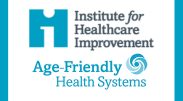

- Named a U.S. News High Performing hospital in maternity care, cancer care, geriatrics, neurology and neurosurgery, pulmonology and lung surgery, and urology.
- Designated LGBTQ+ Healthcare Equality Leader by the Human Rights Campaign.
- Designated an age-friendly health system by the Institution for Healthcare Improvement, which recognizes BMC as committed to care excellence for older adults.
- Named to the Becker's Healthcare list of top 150 places to work in healthcare.
- Listed as one of America’s Best-in-State Employers by Forbes.
- Ranked #13 of the Top 100 Women-led Businesses in Massachusetts by the Globe Magazine and The Women's Edge.
- The winner of the Best and Brightest in Wellness Award from the National Association for Business Resources.
- The winner of a WorkWell Massachusetts Award from Healthiest Employers
- The Multiple Sclerosis Center at BMC was named a Center for Comprehensive MS Care
Kate herself has also been recognized for her exceptional leadership, most recently being named to Modern Healthcare’s List of 100 Most Influential People in Healthcare.
Looking ahead: We will continue striving for excellence, as we build programs that provide exceptional care for all our patients and employees. This includes continuing to improve quality and patient satisfaction by bringing together every hospital department daily to better coordinate our work in these areas.
13. Bolstered research efforts
Proudly ranked #1 in National Institutes of Health (NIH) extramural funding among safety net hospitals, BMC has furthered critical research efforts over the past 13 years. Just a few of the projects underway include:
- Leading the Massachusetts HEALing Communities Study, for which we were awarded an $89 million NIH grant to reduce opioid deaths by 40% in four of the state’s most heavily affected communities.
- NIH-supported research projects at BMC’s Center of Excellence in Sickle Cell Disease focus on increasing understanding of disease pathogenesis, the clinical epidemiology of complications of the disease, and defining new treatments for patients.
- Continuing to play an active role in COVID-19 research, including activating 25 COVID-19 clinical research protocols and enrolling 3,000 participants across four areas of COVID-19 research.
- BMC’s Center for Regenerative Medicine (CReM) is one of the few centers in the U.S. focused on manipulating the DNA of patient-derived stem cells to correct genetic defects. CReM is also working toward creating patient-specific medicine and learning how to generate new cells for patients with untreatable conditions, to ultimately create working organs made from patient-derived cells.
Other research initiatives include Boston University Clinical HIV/AIDS Research Training Program, hepatitis C research, the Boston Nutrition Obesity Research Center, the Pathology Tumor Registry Project, the All of Us Research Program, the Providence/Boston Center for AIDS Research, and the Center for Health Economics of Treatment Interventions for Substance Use Disorder, HCV, and HIV.
Looking ahead: As a top 20 recipient of NIH research funding for independent hospitals, we will continue to build our preeminent research program and emphasize research efforts that are devoted to creating a healthier community.


